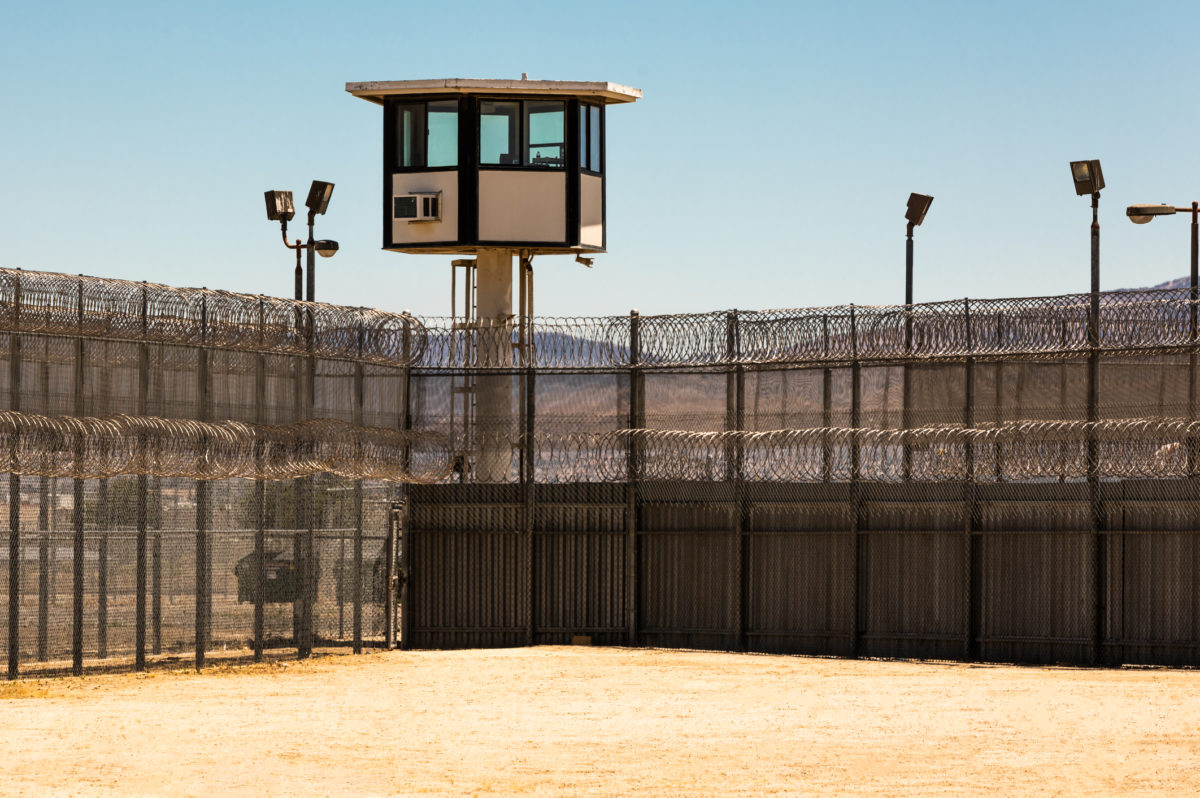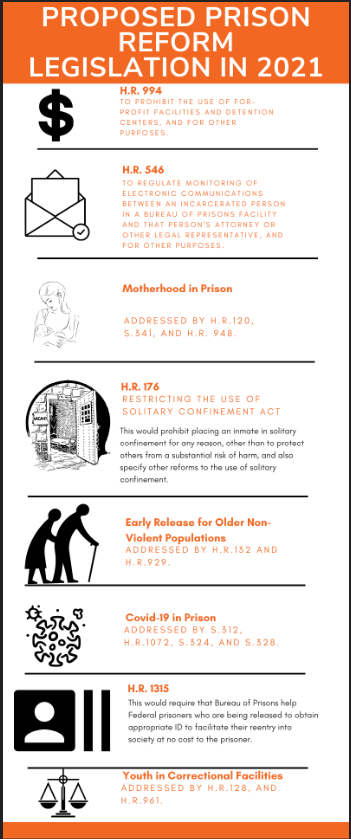
Proposed Prison Reform Legislation In 2021
By Charlotte Spencer
Congress has had several new bills proposed so far this year to address the issue of prison reform. Together, they cover the topics of youthful offenders, nonviolent offenders, elderly offenders, Covid-19, solitary confinement, monitoring of electronic communications, re-entry into society, private for profit prisons, and mothers in prison. Here’s a brief look at all the bills.
Covid-19 in Prison
S.312 – COVID–19 Safer Detention Act of 2021
The long title of this bill is “A bill to expand eligibility for and provide judicial review for the Elderly Home Detention Pilot Program, provide for compassionate release based on COVID-19 vulnerability, shorten the waiting period for judicial review during the COVID-19 pandemic, and make other technical corrections.”
This bill has bipartisan support.
To read the full text click here.
H.R. 1072 – COVID–19 in Corrections Data Transparency Act
This bill is the House equivalent to S. 324. It would mandate the Bureau of Prisons, the U.S. Marshals, and state and local correctional facilities to collect data on Covid-19 tests, test results, cases, case outcomes, and vaccinations in correctional facilities. It would also require them to make this data publicly available. It would also require the CDC to issue guidance for correctional facilities.
To read the full text click here.
S. 324 – COVID–19 in Corrections Data Transparency Act
This bill is the Senate equivalent to H.R. 1072. It would mandate the Bureau of Prisons, the U.S. Marshals, and state and local correctional facilities to collect data on Covid-19 tests, test results, cases, case outcomes, and vaccinations in correctional facilities. It would also require them to make this data publicly available. It would also require the CDC to issue guidance for correctional facilities.
To read the full text click here.
S. 328 – Federal Correctional Facilities COVID–19 Response Act
This would mandate Covid-19 testing and vaccination at federal correctional facilities. It would also require the Department of Justice, acting through the Bureau of Prisons and in consultation with the Centers for Disease Control and Prevention, to release updated guidelines on the management of COVID–19 in correctional facilities. It would also address Covid-19 data collection at correctional facilities.
To read the full text click here.
Motherhood in Prison
H.R. 120 – SIMARRA Act (Stop Infant Mortality And Recidivism Reduction Act)
If made law, this would direct the Bureau of Prisons to establish a pilot program for incarcerated women and their children born during incarceration to reside together in a separate prison housing unit. Specifically, an inmate would be eligible to apply for this if she was pregnant at the beginning of her imprisonment and was in the custody of the Federal Bureau of Prisons. An inmate would be allowed to remain in the program for a maximum of 30 months.
To read the full text click here.
S. 341 – Justice for Incarcerated Moms Act
This bill is the Senate equivalent to H.R. 948. This would mandate establishing model programs to optimize maternal health outcomes for pregnant and postpartum individuals in at least six Bureau of Prisons facilities. It would also create a grant program for similar programs in state and local prisons. It would also mandate making reports on such programs.
To read the full text click here.
H.R. 948 – Justice for Incarcerated Moms Act of 2021
This bill is the House equivalent to S. 341. This would mandate establishing model programs to optimize maternal health outcomes for pregnant and postpartum individuals in at least six Bureau of Prisons facilities. It would also create a grant program for similar programs in state and local prisons. It would also mandate making reports on such programs.
To read the full text click here.

Solitary Confinement
H.R. 176 – Restricting the Use of Solitary Confinement Act
This would prohibit placing an inmate in solitary confinement for any reason other than to protect others from a substantial risk of harm. It would also require comprehensive medical and mental health examinations of those placed in solitary confinement. Further, inmates who fall under the category of “vulnerable person” would be placed in a medical or other unit instead of solitary confinement. This would also prohibit denying those in solitary confinement basic needs such as medical care, food, or water. It would also limit the amount of time a person can be put into solitary confinement, and establish procedure for hearings and reviews in which the inmate could contest the solitary confinement.
To read the full text click here.
Youth in Correctional Facilities
H.R. 128 – RAISE Act of 2021
If made law this would provide alternatives to incarceration for youth. It would allow courts to impose lower than minimum sentences on youth if the youth’s offense had been nonviolent, the minimum sentence was not necessary to protect the public, and the minimum sentence would result in substantial injustice to the youth given the nature of the crime and the chances of rehabilitation. All parties would get notice of the court’s intent to do so and a chance to respond before a final decision was made. It would also update specifications concerning home confinement, supervised release, probation, and specialized housing programs for youth accordingly. This would also mandate establishing pilot programs including programs focusing on mentorship, government service, service to abandoned and rescued animals, diversion for high risk youth, diversion for victimized youth, and diversion for youth who serve as primary caretakers for younger children, or ill or impaired adults.
To read the full text click here.
H.R. 961 – Justice for Juveniles Act
This would amend 42 U.S.C. 1997e to create an exemption for prisoners under 22. In other words, although prisoners are usually required to exhaust all administrative remedies before bringing suit for prison conditions, people who are under 22, or who are bringing suit for conditions that occurred before they were 22 would be exempt from this requirement.
To read the full text click here.
Early Release for Older Non-Violent Populations
H.R. 132 – Federal Prison Bureau Nonviolent Offender Relief Act of 2021
This bill would increase the number of nonviolent offenders who are released from prison early. Specifically, prisoners who are at least 45 years old, have never been convicted of a violent crime, and have never violated disciplinary regulations in a violent way would be released once they had served half of their term.
To read the full text click here.
H.R.929 – To provide that the amount of time that an elderly offender must serve before being eligible for placement in home detention is to be reduced by the amount of good time credits earned by the prisoner, and for other purposes.
To read the full text click here.
Other Bills
H.R. 546 – Effective Assistance of Counsel in the Digital Era Act
In general, this would allow for the recording of, and retention of, privileged electronic communications between prisoners and lawyers, but would not allow anyone else to access these without a warrant. In cases where a system for prisoners to send privileged electronic communications to their lawyers does not already exist it would mandate creating one.
This bill has bipartisan support and has passed the house.
To read the full text click here.
H.R. 1315 – To amend title 18, United States Code, to require that Bureau of Prisons help Federal prisoners who are being released to obtain appropriate ID to facilitate their reentry into society at no cost to the prisoner, and for other purposes.
The full text is not available yet.
To read the full text when it becomes available click here.
H.R. 994 – Justice is Not For Sale Act of 2021
This would ban the use of for-profit prisons and detention facilities at the Federal level. It would eliminate all federal contracts for privately run prisons within two years. It would also ban private for-profit prisons at the state level in cases where those businesses were engaged in or affecting interstate commerce. This is because the federal government only has the power to enforce such a law on the state level if interstate commerce somehow comes into play. The Attorney General would still have the power to authorize a waiver for states or local governments who were not able to meet this standard within two years.
To read the full text click here.
The writer is a lawyer and a coder, and a member of the Arizona bar.
If you have feedback on this article, please write to us at marketing@biometrica.com.